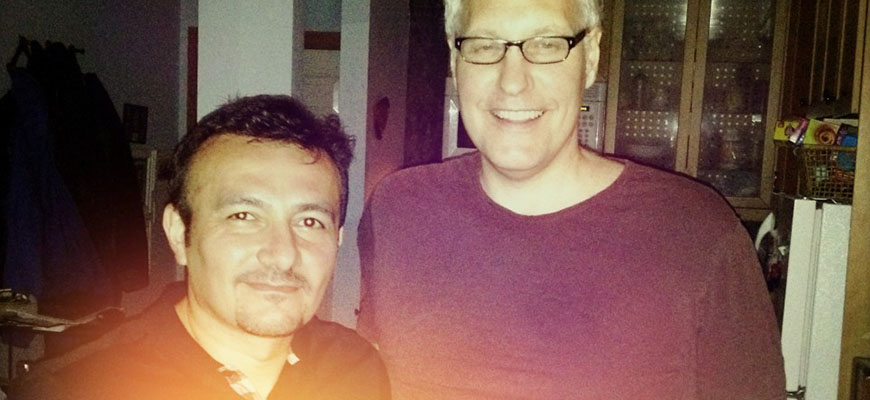Anders and Tekim – Photo by Brendan Dowd
By: Brendan Dowd, Director of the Center on Intercultural Exchange and Interfaith Collaboration
The evening honey butter light dripped from the windowpanes into mugs of spiced ginger tea. Our full bellies bulged after a feast of pillow bread, quinoa and black bean burgers, and homemade berry sorbet. Little Goat’s Stephanie Izzard would have been impressed by the creative presentation and flavor combinations orchestrated by this “vertically-unchallenged” father of Swedish descent cooking for a couple of complete strangers.
Good food, good conversation, peppered with a willingness to be vulnerable moved three men of completely different backgrounds to meet on a warm spring evening in March.
This was my first time in Des Plaines–a suburb Northwest of Chicago. The host for this evening’s meal is a member of the St. Martin Episcopal Church—just one of the more than two dozen Churches of varying denominations located in and around the city limits.
Staring through the windshield, telephone pole after telephone pole flipped past while late afternoon sun blanketed the recently thawed pines in a rusty glow . Upon pulling into the lot outside the home of Anders, our Abraham’s Tent host for the evening, I decided that regardless of how the dinner may turn out, at least I would have had at a nice cruise through the countryside. I’m either learning to enjoy the simple things, or I’ve been stuck in the city for too long!
I was excited to meet my host, after weeks of exchanges over the phone. Anders attended the Niagara Foundation’s Abrahamic Traditions dinner in Mt. Prospect in February and found the provocative offer of hosting an Abraham’s Tent dinner from strategically placed information cards too tempting to pass up. I didn’t meet him at that event, but a few days after I linked him to other Niagara friends in his suburban community to host a home-based interfaith dinner. But as the day neared, it looked like only one other dinner participant, Tekin, a local Muslim entrepreneur, would be attending.
I was unsure about what the conversation dynamic would be like with such a small group. I was worried as I pushed the cold button outside the apartment complex, but felt the tension in my muscles instantly release as I was greeted by a firm handshake from Anders, the scent of freshly chopped herbs, and a scattering of tiny sneakers, colored pencils, and finger paintings. This proud father of two apologized for what he called a “mess.” However, it takes a little more than some misplaced action figures to shock this elder brother of four. The irony is that I felt more at home in Anders’ “mess” than in the sterile steel and granite-topped kitchens of some of my closest friends.
Within minutes, Tekin arrived with his right arm extended for a handshake and a box of Turkish chocolates under the other. The new guy and I began tearing into hot pillow bread while Anders worked his culinary magic in the kitchen, clinking pots and slinging small dishes of curried dipping sauces across the table. One advantage to a small group in a smaller space is that the guests get the chance to interact with the host as he or she preps. As a guest, you’re not only sharing in the meal, but you’re also observing and engaging in its production. Intimacy points.
Chatter rolled in like tides. Anders went first. He talked about his love of cooking, his two boys who bring joy to his life, his work in the city, and his conservative evangelical-Christian upbringing.
Next came Tekin. He shared his business ventures across the Midwest, the struggles and thrills of being an independent business owner, and stories of the streets of his native Turkey. Finally, there was me, Brendan, I spoke of my adventures in the Aleutians, my ongoing battles with academia, my Catholic upbringing, and my new family with Niagara.
Finally, the teapot was singing and the late evening was light dripping into the room. Tea was swirled into mugs held in the hands of men exhausted by a hard night’s work of eating Anders’ delicious food. The tea did more than speed digestion, it was an element that invited three seemingly stoic men to open up and share their struggles with relationships, unwarranted expectations, and desires.
I came to the dinner doubting its significance, and to be completely honest, I carried a piece of the doubt in me for the next couple of days. Did this meeting of just three people change anything? How was the Abraham’s Tent program doing anything to combat intolerance? But I realized as the second dinner between Tekin and Anders was scheduled before the week’s end, that the power really is in the relationship. These two men have since met with others from their community on two (yes two!) separate occasions for barbeques I’ve heartbreakingly missed. Lavraki anyone?
Peacebuilding pioneer, John Paul Lederach writes in beautiful haiku:
Don’t ask the mountain
To move, just take a pebble
Each time you visit.
In the business of building community cohesion, it’s the small victories, the sharing of stories with strangers, and the planting of single seeds that brings hope for a fruitful harvest. I’m not speaking here of some metaphoric theological harvest but instead, of a harvest that provides fresh food to a table where individuals of all races and religious convictions are seated in a conversation. The wait staff this evening–mutuality and respect.
Want to be a part of the next Abraham’s Tent Dinner? Find out more here.

